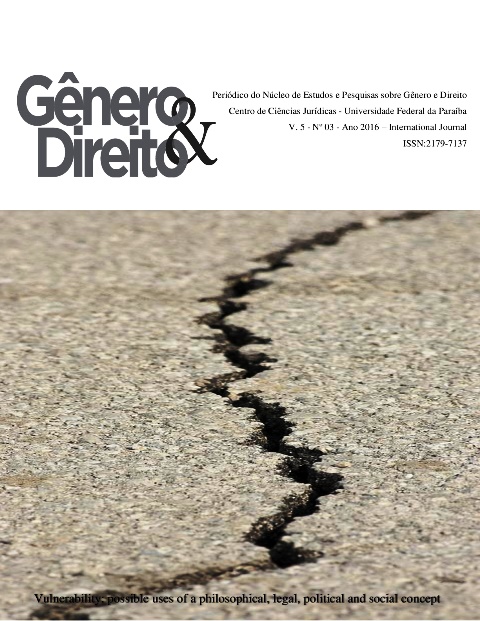POLITICS, JUSTICE AND THE VULNERABLE SUBJECT: THE CONTRIBUTION OF FEMINIST THOUGHT
Palavras-chave:
vulnerability, precarity, privilege of ignorance, epistemic responsibility, enabling justice.Resumo
The present article argues that the main contribution of contemporary feminist theory on vulnerability stems from the distinction of two possible kinds of vulnerability: an ontological vulnerability and a vulnerability linked to various processes (social, cultural, economic and juridical) of vulnerabilisation. This contribution is not limited to the critical and deconstructive level. As a positive proposal, it advances in the direction of an individual which, recovering its own relational, embodied, "fleshy" and situated dimension, abandons the illusion of its own sovereignty, accepts its vulnerability like an opening up to others, and thus also accepts the responsibility for an open and democratic dialogue and the need for institutions inspired by an "enabling" conception of justice (cf. Young 1990).Downloads
Referências
Agamben, Giorgio (1998), Homo Sacer: Sovereign Power and Bare Life. Trans. Daniel Heller-Roazen. Stanford: Stanford UP.
Alaimo, Stacy (2009), “Insurgent Vulnerability and the Carbon Footprint of Gender,” Kvinder, Køn & Forskning, 3-4: 22-35.
Alaimo, Stacy (2010), “The Naked Word: The Trans-corporeal Ethics of the Protesting Body”, Women & Performance: a journal of feminist theory, 20, 1: 15-36.
Alcoff, Linda Martí (2006), “Epistemologies of ignorance: Three types”, in Sullivan and Tuana (eds.), Race and epistemologies of ignorance. Albany: State University of New York Press: 39-58.
Anderson, Elizabeth (2006), “The epistemology of Democracy”, Episteme: A Journal of Social Epistemology, 3,1: 8-22
Anderson, Elizabeth (2013), The Imperative of Integration. Princeton: Princeton University Press.
Bacchi, Carol and Beasly, Chris (2002), “Citizen bodies: is embodied citizenship a contradiction in terms?”, Critical Social Policy, 22, 2: 324-352.
Bacchi, Carol and Beasly, Chris (2004), “Moving Beyond Care and/or Trust: An Ethic of Social Flesh”, Refereed paper presented to the Australasian Political Studies Association Conference University of Adelaide University Australia 29 September – 1 October.
Beasly, Chris and Bacchi, Carol (2012), Making politics fleshly: The ethic of social flesh, in Bletsas, and Beasley, Engaging with Carol Bacchi. Strategic Interventions and Exchanges, University of Adelaide Press: 99-120.
Butler, Judith (2006), Precarious Life: The Power of Mourning and Violence. New York: Verso.
Butler, Judith (2009), Frames of War. When is Life Grievable? New York: Verso.
Butler, Judith (2015), Notes towards a Performative Theory of Assembly. Cambridge (Mass.), London: Harvard University Press.
Casalini, Brunella (2015), “The 'Materialist' Bent in Contemporary Feminist Theory”, Revista gênero e direito, 2: 134-147
Castoriadis, Cornelius (1991), Philosophy, Politics, Autonomy: Essays in Political Philosophy. Edited by David Ames. New York: Oxford University Press.
Cavarero, Adriana (2007), Orrorismo ovvero della violenza sull'inerme. Milano: Feltrinelli.
Cavarero, Adriana (2014), Inclinazioni. Critica della rettitudine. Milano: Raffaello Cortina.
Code, Lorrain (1987), Epistemic Responsibility. University Press of New England.
Code, Lorraine (2006), Ecological Thinking. The Politics of Epistemic Location. New York: Oxford University Press, New York.
Code, Lorraine (2014), “Ignorance, Injustice and the Politics of Knowledge”, Australian Feminist Studies, 29, 80: 148-160.
Code, Lorraine (2015), “Care, Concern and Advocacy: Is There a Place for Epistemic Responsibility?”, Feminist Philosophy Quarterly, 1, 1: 1-20.
Code, Lorraine (2016), “The Myth of the Individual”, The American Journal of Bioethics, 16, 2: 59-60.
Darling, Jonathan (2009), “Becoming Bare Life: Asylum, Hospitality, and the Politics of Encampment”, Environment and Planning D: Society and Space, 27: 649-665.
De Chiro, Giovanna (2008), Living environmentalisms: coalition politics, social reproduction, and environmental justice, Environmental Politics, 17, 2: 276–298.
Delphy, Christine (2009), L'énemi principal, Éditions Syllepse, Paris.
Federici, Silvia (2012), Revolution at Point Zero: Housework, Reproduction, and Feminist Struggle, PMPress, Oakland, CA.
Fineman, Martha A. (2004), The Autonomy Myth: Lies We Tell Ourselves about Dependency and Self-sufficiency. New York: The New Press.
Fineman, Martha A. (2008), “The vulnerable subject: Anchoring equality in the human condition”, Yale Journal of Law and Feminism, 20, 1: 1–23.
Gilson, Erinn (2011), “Vulnerability, Ignorance, Oppression, Hypatia”, 26, 2: 308-332.
Gilson, Erinn (2013), The Ethics of Vulnerability: A Feminist Analysis of Social Life and Practice. London: Routledge.
Knudsen, Britta Tim and Stage, Carsten (2015), Global Media. Biopolitics and Affect. Politicizing Bodily Vulnerability. New York-London: Routledge.
Logue, Jennifer (2013), “The Politics of Unknowing and the Virtues of Ignorance: Toward a Pedagogy of Epistemic Vulnerability”, Philosophy of Education: 53-62, in <http://ojs.ed.uiuc.edu/index.php/pes/article/view/3982>
Maillard, Nathalie (2011). La vulnérabilité. Un nuouvelle catégorie morale?, Genéve: Labor et Fides.
Mackenzie, Catriona (2014), “The Importance of Relational Autonomy and Capabilities of an Ethics of Vulnerability, in Mackenzie, Rogers and Dodds (eds.), Vulnerability: New Essays in Ethics and Feminist Philosophy, Oxford: Oxford University Press: 33-59.
Medina, José (2013), The Epistemology of Resistance. Gender and Racial Oppression, Epistemic Injustice, and Resistant Imaginations, Oxford: Oxford University Press.
Nussbaum, Martha (2001), Upeheavals of Thought. The Intelligence of Emotions. Cambridge (UK): Cambridge UP.
Nussbaum, Martha (2004), Hiding from Humanity: Disgust, Shame and the Law. Princeton: Princeton University Press.
Nussbaum, Martha (2013), Political Emotions, Cambridge (Mass.)-London: Harvard University Press.
Sedgwick Kosovsky, Eve (1990), The Epistemology of the Closet. Los Angeles: University of California Press.
Sullivan, Shannon and Tuana, Nancy (eds. by) (2007), Race and Epistemologies of Ignorance. Albany (NY): SUNY Press.
Tilly, Charles (1998), Durable Inequality. Los Angeles: University of California Press.
Tuana, Nancy (2004), “Coming to understand: Orgasm and the epistemology of ignorance”, Hypatia 19, 1: 194–232.
Tuana, Nancy (2006), “The speculum of ignorance: The women’s health movement and epistemologies of ignorance”, Hypatia 21, 3: 1–19.
Tronto, Joan (1990), “Chilly Racists”, Paper presented to the annual meeting of the American Political Science Association, San Francisco, California, August 30–September 2.
Tronto, Joan (1993), Moral Boundaries: A Political Argument for an Ethic of Care. New York: Routledge. Tronto, Joan (2013), Caring Democracy: Markets, Equality, and Justice. New York: New York University Press.
Val, Plumwood (2002). Environmental Culture, New York-London, Routledge.
Michalinos, Zembylasa, Vivienne, Bozalekb and Tammy, Sheferc (2014), “Tronto’s notion of privileged irresponsibility and the reconceptualisation of care: implications for critical pedagogies of emotion in higher education”, Gender and Education, 26, 3: 200–214.
Wingrove, Elizabeth (2015), “Materialisms”, in Disch and Hawkesworth (eds), The Oxford Handbook of Feminist Theory. Oxford: Oxford University Press.

